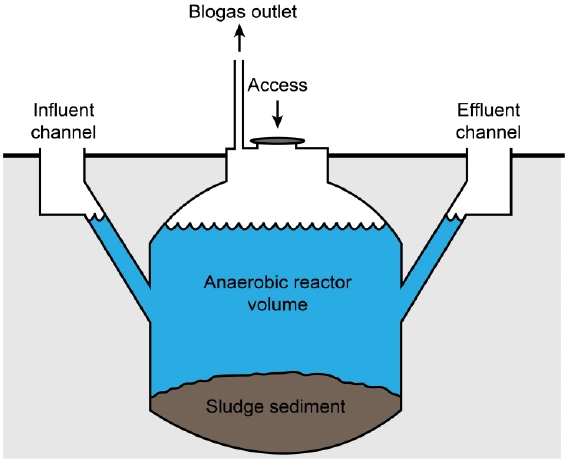How to Produce Biogas in Nigeria
Biogas is derived from two word “bio” and “gas”. Bio is the shortened word for biological, meaning life while gas means a substance that is neither solid nor liquid.
Simply, biogas or biological gas is defined as a mixture of gases produced during anaerobic decay of organic wastes by the action of anaerobic microbes. Organic waste refers to animal manure, plant material, kitchen waste, sewage, etc.
👉 Relocate to Canada Today!
Live, Study and Work in Canada. No Payment is Required! Hurry Now click here to Apply >> Immigrate to CanadaBiogas is produced when organic waste is digested in an air tight or closed system in the absence of oxygen. For biogas to be produced, anaerobic bacteria must ferment organic waste in an air tight container.
Read Also: 10 problems in Nigeria oil and gas industry and possible solutions

Biogas comprise of methane gas, carbon dioxide gas, hydrogen gas, hydrogen sulphide gas. The percentage composition of gases that make up biogas are methane gas-50%-70%, carbon dioxide-30%- 50%, hydrogen sulphide-0%-3%,hydrogen gas-0%-1%.
Over 80% of Nigerians still use cooking gas, firewood, charcoal and kerosene to cook everyday. However, these cooking fuels have become expensive because of their rising prices and deforestation.
This has made it difficult for people to cook their meals conveniently and with a cheap source of fuel everyday.
Hence, this has made them to search for less expensive, more affordable and renewable sources if cooking fuel, which biogas fits the bill as it is easy to produce.
Many of us produce and waste large volumes of biogas daily which could be harnessed to produce clean, renewable energy and generate income for them and the government.
Read Also: 25 top oil and gas companies in Nigeria
👉 Relocate to Canada Today!
Live, Study and Work in Canada. No Payment is Required! Hurry Now click here to Apply >> Immigrate to CanadaWhen we pass farce and urine in the toilet, we flush them into the underground sewage system. Little did we know that we have wasted the opportunity of using our wastes to harness cheap energy -biogas.
It is in the underground sewage pit that anaerobic bacteria decomposes our wastes to produce methane gas and other biogas components.
Sadly, they are wasted away when they are released into the atmosphere. Consequently, cheap fuel is wasted away because of our ignorance about their importance.
Profitability of Producing Biogas in Nigeria
Biogas production enterprise has huge economic and health benefits . They are:
1. People use fuel to cook everyday
There is an increasing demand for sustainable and cheaper fuels for cooking in Nigeria. People in Nigeria spend a lot of money to buy firewood, charcoal and kerosene to cook their food daily.
These fuels have become increasingly expensive daily. Most Nigerians can no longer afford to buy them. Again, the frequent use of firewood and charcoal has led to the depletion of forest trees.
Wood and kerosene release harmful gases like carbon dioxide and other green house gases which cause cancer and pollute the atmosphere.
Fortunately, biogas offers an excellent alternative. It is easy to produce and can assist in reducing the large quanties of greenhouse gases resulting from the use others fossil fuels. It is a cheaper, cleaner and safe alternative.
2. There is a suitable environment for biogas production in Nigeria
Anaerobic microbes thrive best at temperatures above 15 degrees centigrade. This temperature favours the activities of microbes that ferment organic waste to produce biogas.
This is the temperature that operates in the Nigerian climate. Consequently, the production of biogas is favoured more in Nigeria because of its tropical temperature.
Read Also: 10 Hottest Professional Courses needed in the Oil and Gas Industry
3. Availability of organic matter to produce biogas
In Nigeria, we generate a lot of organic waste everyday. This provides a lot of organic wastes required for biogas production.
Be it from faecal and urinary wastes deposited into the sewage and septic tanks or kitchen wastes, farm animal manure, there is the guaranteed production and supply of organic wastes for biogas production.
4. Installation of biogas systems
In Nigeria, there are a few people with the technical know-how to install and run a biogas plant. However, you can learn the skills required to produce biogas, design and install your own biogas system.
Doing these enables you to start your own biogas design and installation company, which allows you to install biogas plants for clients for good amount of money. You make profit buy doing these.
5. Sales of biogas equipment
In Nigeria there is paucity of biogas equipment. You can start selling them with their installation kits to customers to make money.
Read Also: Maxi Gas Cooker Price in Nigeria, Features and Review
Amount of Money Needed for the Investments
You need between $50-$75 per cube meter to start up on a small scale. This amount is for establishing a biogas plant which includes all important installations excluding the land.
Calculating the cost in naira using #360 to a dollar as the current exchange rate, it equals 50×360=#18,000 per cube meter. At $75, it would be 75×360= #27,000 per cube meter capacity.
For commercial production, $3500 to $5500 is required.
Tools/Materials/Ingredients Needed
The following tools are required:
a. Biodigester
b. Organic waste outlet
c. Effluent outlet
d. Biogas outlet
Ingredients
a. Animal manure
b. Poultry droppings
c. Cow urine
d. Kitchen waste
e. Dedicated energy crops
f. Plant materials
g. Agricultural by-products
h. Slurry
i. Agricultural waste
j. Catering waste
k. Sewage sludge
Where to Get Them
a. Biogas equipment can be procured from General markets
b. Biogas equipment can also be procured from companies and dealers selling them.
c. Inlet and outlet pipes can be procured from plumbers.
d. Organic wastes can be procured from farms, hotels and restaurants.
Step-by-Step Process of Production
a. Pour organic waste into the digester through the organic waste inlet.
b. Allow the organic waste to settle in the digester.
c. Allow the organic waste to ferment by the action of anaerobic microbes for 15-21 days at high temperature(above 15 degrees Celsius).
d. The first batch of biogas is produced between 15-21days.
e. The biogas builds and rises at the top if the digester.
f. The biogas is now collected from a gas pipe attached at the top of the digester.
g. The gas pipe carries the biogas produced to a cylinder in the kitchen where it is used as fuel for cooking.
Read Also: 9 Ways To Join Oil and Gas Business in Nigeria with minimal capital
Packing Strategies
Biogas is mainly packaged in air tight gas cylinders. The cylinders could be 15kg, 3kg, 12kg and 25kg.
Marketing Strategies
a. Can be sold directly to schools, universities, owners of residential buildings.
b. Can be sold to local and state governments.
c. Can be sold directly to international organisations.
d. Can be marketed to filling stations directly.
e. Can be sold directly to international development agencies.
Conclusion
It is easy to produce biogas for use at home and in commercial quantity. This will elimate the rising cost of fossil fuels used for cooking and heating homes.
The potentials of biogas as a money spinner is enormous and yet to be rapped fully. You can create wealth by using these article as a guide to produce biogas.
